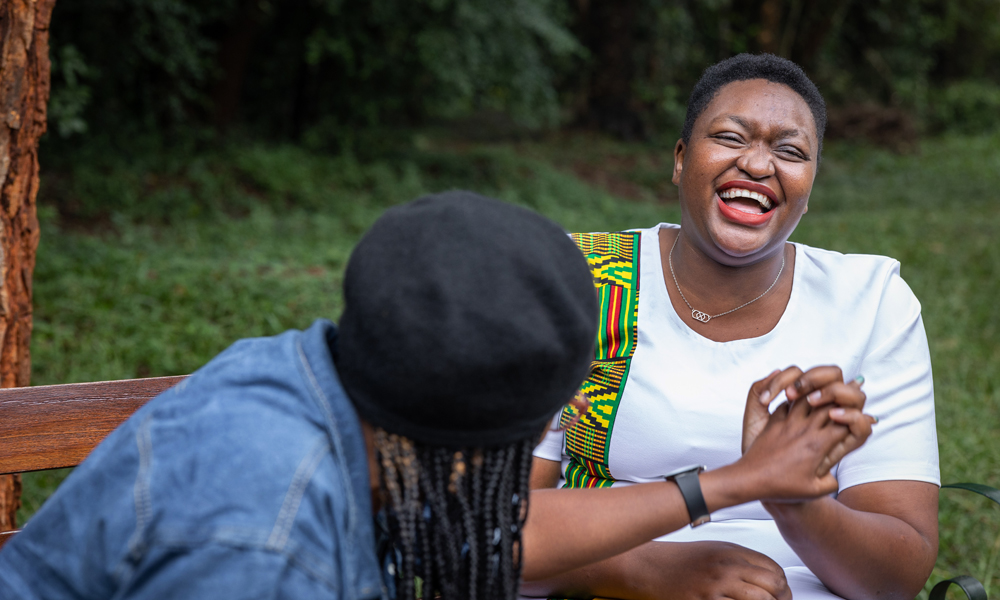We talk to PASAN about the Positive Women’s Leadership Project (POWER Project) and the organization’s work to empower and improve the lives of those identifying as women in the HIV community…
According to the Canadian AIDS Society, women make up a significant proportion of people living with or at risk of HIV/AIDS in Canada – about one in five people living with HIV as of 2014 was female. In fact, an estimated 16,880 females live with HIV (including AIDS), representing 22.4 per cent of the national total.
All women have risk factors for HIV infection, but women who belong to socially and economically marginalized populations face a number of interconnecting determinants of health that adversely impact their risk for HIV infection and their experiences accessing diagnosis, care, treatment and support. African, Caribbean and Black women, Indigenous women, trans women, women who use drugs, women who experience violence, and women who are incarcerated are at a higher systemic risk for HIV.
To learn more about the challenges specific to women living with HIV across Canada, we spoke to both Claudia Medina, Program Director , and Amina Mohamed, Women’s Community Programs coordinator at PASAN. Formed in 1991 as a grassroots response to HIV in the Canadian prison system, PASAN is a community-based prisoner health and harm reduction organization that provides support, education and advocacy to prisoners and ex-prisoners across Canada. Today, PASAN is the only community-based organization in Canada exclusively providing HIV and HCV prevention, education and support services to prisoners, ex-prisoners and their families. In addition to individual support services, PASAN conducts HIV prevention education programs in many adult institutions in the southern Ontario region. This program includes a Peer Educators Group, where ex-prisoners living with HIV are educators for current prisoners.
Can you tell us about PASAN and how it supports the HIV community in Canada?
PASAN is a community-based organization that provides advocacy, education and support to prisoners on health issues related to HIV, hepatitis C and harm reduction. We provide health promotion workshops to prisoners in provincial and federal institutions in Ontario, and provide advocacy and re-integration support to people with lived experience of incarceration in community.
What is the POWER project?
In the fall of 2017, a strategic initiative called the Circle of Care began with agencies such as the AIDS Committee of Toronto (ACT), Black Coalition for AIDS Prevention (Black CAP), PASAN, the Teresa Group and the Toronto People with AIDS Foundation (PWA). A consultation process was facilitated and organized by HIV+ women, which shaped a new project called POWER that reflected the need for a new direction in the provision of services for women. It was defined that HIV+ women would be the leadership of this movement, strengthening the leadership of HIV+ women. POWER supports and engages HIV+ women in key project leadership roles to oversee, guide and implement the program activities. The project is led by a coordinator to oversee the program’s activities through PASAN and five program coordinators from each partner agency.
What are the goals or objectives of the POWER project?
It is a leadership program developed with and for positive women to continue building self-care, self-advocacy skills, personal relationships and community leadership. HIV+ women created a vision to be engaged and empowered leaders in the community, build knowledge and share skills, and be united to challenge stigma, advocate and create a positive woman-centred future. The focus of the key program activities is on amplifying women’s leadership in three different learning settings: forums (in person and online), skills building leadership and self-advocacy workshops. We are also exploring possible development of women-led trainings by and for HIV-positive women.
The POWER project has existed since 2017, and it continues through the support of fund grants from ViiV Healthcare’s Community Education and Services Grants program.
Why do you think International Women’s Day is a particularly important day for women living with HIV?
We define women as all people who identify as women; this is inclusive of cis and transgendered women. International Women’s Day is important for HIV+ women because it is a day that women can celebrate themselves, their personal accomplishments, their identities and their futures. While there have been many advancements in HIV treatment, stigma about HIV continues to be a reality – women still face discrimination and HIV phobia every day. On International Women’s Day, women can celebrate that they can still succeed and accomplish their hopes and dreams regardless of their HIV status. On this day, women can also celebrate their future dreams, as people living with HIV are now living longer due to effective treatment and U=U (Undetectable = Untransmittable).
What is the benefit of having women-centred programs for women living with HIV?
Women living with HIV have distinct social, emotional and health needs. Women need a dedicated confidential space for themselves, as there is no organization that provides services solely to women living with HIV. POWER is a place where women can feel heard, supported and celebrated in their leadership roles in the community. This project encourages peer involvement and practises greater/meaningful engagement of people living with HIV. POWER also acts as a first stepping stone for women to build on their own skills to obtain employment opportunities in the HIV sector.
How can people learn more about PASAN and the POWER project?
For more information about PASAN, you can visit our website at www.pasan.org, or find us on Instagram at @prisonharmreduction. At this time we are hiring for a new POWER coordinator – you can contact claudia@pasan.org for any questions you may have about POWER.
To learn more about PASAN and to access resources, visit www.pasan.org/resources.html.
Fast facts from Women & HIV/AIDS Initiative (WHAI):
- In 2019, almost 60 per cent of new HIV diagnoses among women in Ontario were in African, Caribbean and Black (ACB) women.
- In 2019, 11 per cent of new HIV infections among women in Ontario were in Indigenous women.
- Trans women are 10 times more likely to report having been diagnosed with HIV than other women.
- Almost 50 per cent of women living with HIV reported having experienced intimate partner violence, according to a 2017 cohort study.
Did you know?
In Canada, there are fewer than five associations dedicated to supporting women living with HIV, despite the fact that these women make up 22.4 per cent of the national total. The experience of women living with HIV is characterized by unique stigmas, their societal roles as caregivers, their race, and their social and economic status.
Having national supports available for people who identify as women is crucial to improving quality of life, addressing societal stigma, and providing access to quality care and treatment.
You can find more information on how you can support women living with HIV and help reduce stigma in their everyday lives by visiting one of these resources:
Women and HIV/AIDS Initiative: https://whai.ca
The CTN: CIHR Canadian HIV Trials Network: https://www.hivnet.ubc.ca/research-categories/women-girls
Women’s Health in Women’s Hands: https://www.whiwh.com
Canadian HIV Women’s Sexual and Reproductive Health Cohort Study: https://www.chiwos.ca







POST A COMMENT